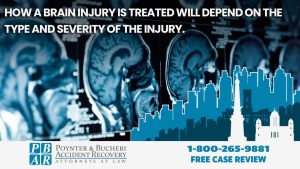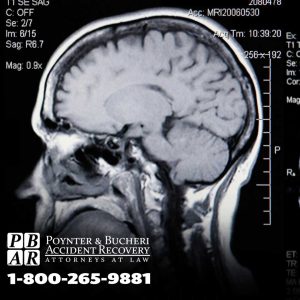Suffering a Traumatic Brain Injury (TBI) can have profound and far-reaching effects on your life. A Traumatic Brain Injury disrupts normal brain function and can lead to long-term physical, cognitive, and emotional challenges. That is when you should call one of our Brain Injury Lawyers.
Navigating a Traumatic Brain Injury claim in Indiana requires specialized knowledge and experience, making it crucial to have a skilled Traumatic Brain Injury Attorney by your side.
An experienced Indiana Traumatic Brain Injury Lawyer understands Traumatic Brain Injury law, has experience winning Traumatic Brain Injury Cases and manages the details (especially important if your Traumatic Brain Injury caused difficulty concentrating).
Traumatic Brain Injury Attorneys are experts at the legal process, from gathering evidence and negotiating with insurance companies to representing you in court if necessary.
An expert Traumatic Brain Injury Attorney protects your rights to compensation for medical costs, decreased earnings, and pain and suffering.
Navigating the legal system can be overwhelming. Our experienced attorneys at Poynter & Bucheri are here to guide you every step of the way. Call for a free consultation of your open or closed head injuries case.
Let the Poynter & Bucheri Law Firm fight for your rights to protect you and your family. Call us today at 1-800-265-9881 for a free case review by an experienced head injury attorney.
What Is a Traumatic Brain Injury (TBI)?

A Traumatic Brain Injury is caused by a blow, jolt, or bump to the head that disrupts normal brain function. Severe, moderate, or mild traumatic brain injuries can be temporary or permanent.
A mild Traumatic Brain Injury is a mild concussion that can briefly disrupt consciousness and brain function. If you’ve had a mild TBI (concussion), you might remember being advised to stay awake to monitor symptoms.
Any Traumatic Brain Injury can develop into a severe TBI, leading to long-term disability or even death. Traumatic Brain Injury Lawyers can help you assess the long-term impact of your injuries and how they may impact your compensation claim.
Discuss your case with a Traumatic Brain Injury Lawyer by calling P&B Brain Injury Law at 1-800-265-9881. Our Brain Injury Lawyers know what to do.
Types of Traumatic Brain Injuries
Here are some common types of serious Traumatic Brain Injuries and their potential complications:

- Contusions: These are bruises on the brain from direct impacts that can be mild Traumatic Brain Injuries. A severe cerebral contusion can cause brain swelling and disrupt oxygen flow.
- Hypoxic Brain Injuries: These happen when the brain doesn’t get enough oxygen, often due to incidents like near-drownings, medical malpractice, or exposure to toxins such as carbon monoxide, causing permanent damage.
- Brain Hemorrhages: Internal bleeding in the brain, also known as hemorrhages, can result from strong impacts and are often called strokes when they occur in the brain. Brain bleeds are a serious type of Traumatic Brain Injury Case that can be fatal.
- Skull Fractures: Severe Traumatic Brain Injuries may involve a fractured skull. Untreated, these can lead to infections, pressure on the brain, or cerebrospinal fluid leaks.
- Diffuse Axonal Injury (DAI): This involves widespread damage to the brain’s nerve fibers due to rapid acceleration or deceleration, in a typical brain injury case car accident. DAIs can cause significant disruptions to brain communication pathways and may lead to severe disability or coma.
- Penetrating Brain Injuries: These occur when an object penetrates the skull and brain tissue, such as a bullet or shrapnel. Victims who suffer traumatic brain injury can cause extensive damage depending on the depth and path of penetration.
- Intracranial Hematomas: These are accumulations of blood within the brain or between the brain and the skull, caused by ruptured blood vessels.
- Coup-Contrecoup Injuries: These occur when the brain strikes the opposite side of the skull after an initial impact, causing damage at the point of impact and the opposite side.
- Second Impact Syndrome: This happens when a second TBI occurs before the first has fully healed, leading to rapid and severe brain swelling and increased intracranial pressure, which can be fatal.
Prompt and proper medical care is crucial for minimizing long-term impacts. As soon as you’ve secured medical care, contact our Indianapolis Brain Injury Lawyers so we can fight for your rights.
After a TBI, you may be entitled to pursue compensation for your damages. Call our Traumatic Brain Injury Lawyers today at 1-800-265-9881 for a free case review.
Common Causes of Head Trauma
Head trauma can lead to a Traumatic Brain Injury in various ways.
Here are the most common causes of head trauma and TBI in the U.S., according to the Centers for Disease Control and Prevention (CDC):

- Slip and falls: Falls are the leading cause of severe brain injuries, accounting for 40.5% of cases, according to the CDC. Common locations for head injury-inducing falls include stairs, cluttered walkways, wet surfaces, uneven floors, ramps, doorways, ladders, unstable work areas, and unguarded heights.
- Being struck by an object: Being struck by or against an object is the second most common cause of TBIs, making up 15.5% of brain injuries.
- Motor vehicle accidents: Car accidents cause a large percentage of TBIs. Brain trauma can occur if the head strikes something inside the vehicle, such as the windshield or steering wheel, during a crash. Even without direct impact, the force of the motor vehicle accident collision can cause the brain to hit the inside of the skull.
- Assaults: Assaults account for 10.7% of brain injuries annually. These injuries can result from physical attacks, such as blows to the head, blunt force trauma, or other violent incidents that can cause a closed head injury or penetrating head injury.
- Sporting injuries: Participating in contact sports like football, hockey, or boxing can lead to TBIs due to repeated impacts to the head, falls, or collisions.
- Explosions: Explosive blasts, common in military combat, can cause brain damage due to rapid pressure changes and shockwaves.
- Medical negligence: TBIs can result from medical negligence, such as errors during surgery, misdiagnosis, or delayed treatment of head, neck, and serious brain injuries. These medical mistakes can lead to brain damage, emphasizing the importance of timely and accurate medical treatment.
- Workplace accidents: Injuries at work might result from falls, being struck by equipment, or other hazards in the workplace.
- Bicycle accidents: Cycling accidents can lead to TBIs, particularly if the rider is not wearing a helmet. A Traumatic Brain Injury can occur from falls, collisions with vehicles, or hitting stationary objects.
- Recreational activities: Recreational activities such as skiing, horseback riding, and skateboarding can also result in TBIs. These injuries often occur due to falls or collisions during the activity.
Injured in an accident? Our Brain Injury Lawyers will fight for the compensation you deserve so you can focus on your recovery. Call us today at 1-800-265-9881.
How Does a TBI Affect Your Brain?

A Traumatic Brain Injury is a significant head injury that can lead to long-lasting and potentially life-altering effects on the brain.
Traumatic Brain Injuries result from a sudden impact, such as a blow or jolt to the head or body, or from penetrating brain injuries that disrupt the brain’s normal function.
These serious traumatic brain injuries can cause both immediate and long-term damage, including physical pain and cognitive impairments.
When a Traumatic Brain Injury occurs, the force of the impact can cause various types of brain damage from within the skull.
Here’s a closer look at how a Traumatic Brain Injury can affect the brain:
Structural Damage
A Traumatic Brain Injury can tear or bruise tissue, damage blood vessels, and disrupt the delicate structures within the skull. The force of a head injury or impact may cause the brain to collide with the interior walls of the skull, leading to contusions (bruises) and lacerations (tears) in the brain.
In severe cases, the impact can cause the brain to twist or stretch, damaging nerve fibers and disrupting communication between different brain parts.
Traumatic Brain Injury Impact on Specific Brain Regions
- Frontal Lobe: Injuries can affect decision-making, emotional control, and personality. It can also impair voluntary movement and speech.
- Temporal Lobe: Damage to this area can disrupt memory and language comprehension, leading to difficulties with communication.
- Parietal Lobe: Injuries can impair spatial orientation and the ability to recognize objects and faces.
- Occipital Lobe: This region’s damage can affect vision, causing difficulties in processing visual information.
- Cerebellum: Impairments here can lead to coordination problems, balance issues, and difficulties with fine motor skills.
- Brainstem: Injuries to the brainstem can be life-threatening, affecting basic functions such as breathing, heart rate, and consciousness.
Cerebral Edema (Swelling)
Following a TBI, the brain may swell due to the trauma. This swelling, known as cerebral edema, increases pressure within the skull and can further compress brain tissues. The pressure can hinder blood flow and oxygen delivery to brain cells, exacerbating the damage.
Swelling can also lead to secondary brain injuries if not promptly managed.
Axonal Shearing
The rapid acceleration and deceleration of the brain during a traumatic event can lead to a DAI. This condition involves widespread damage to the brain’s axons, which are the long nerve fibers responsible for transmitting information between neurons.
Axonal shearing can disrupt these connections, impairing brain function and leading to various cognitive and physical deficits.
Bleeding and Hemorrhage
TBIs can cause bleeding within or around the brain, known as hemorrhages. These can occur in different forms, including subdural hematomas (bleeding between the brain and the dura mater), epidural hematomas (bleeding between the dura mater and the skull), and intracerebral hemorrhages (bleeding within the brain tissue).
Hemorrhages can increase intracranial pressure and further damage brain tissue.
Loss of Brain Function
Depending on the severity and location of the Traumatic Brain Injury, a TBI can result in a wide range of functional impairments. These may include memory, attention, language, and executive function difficulties. Physical effects can include motor deficits, coordination problems, and sensory impairments.
Emotional and behavioral changes, such as mood swings, irritability, and depression, are also common following a TBI.
Secondary Complications
TBIs can lead to secondary complications, such as infections, seizures, and hydrocephalus (buildup of cerebrospinal fluid in the brain). These complications can arise from the initial head injury or from medical examination or interventions used to treat the TBI.
Neurochemical Changes
The trauma from a TBI can alter the balance of neurochemicals in the brain, leading to inflammation and the release of harmful substances that can further damage brain cells. These changes can contribute to long-term cognitive and neurological problems.
If you were injured in a motor vehicle accident and suffered a Traumatic Brain Injury, you may be entitled to compensation. Call a Brain Injury Lawyer at 1-800-265-9881 for a free case review.
Conditions Related to Chronic TBIs
Repeated TBIs can result in Chronic Traumatic Encephalopathy (CTE), a progressive brain condition that leads to cognitive decline, behavioral changes, and dementia.
CTE is commonly seen in individuals with a history of multiple head injuries, such as athletes and military personnel.
Additionally, a history of TBIs increases the risk of developing neurodegenerative diseases like Alzheimer’s and Parkinson’s later in life. This heightened risk underscores the importance of managing and preventing head injuries to protect long-term brain and physical health.
How Is TBI Diagnosed?
Diagnosing a Traumatic Brain Injury involves a comprehensive evaluation by medical professionals to assess the extent and nature of the head injury. The process typically starts with a thorough medical history and a physical examination, focusing on neurological function.
Here’s an overview of how TBIs are diagnosed:
Initial Assessment
- Medical history and symptoms: The medical care provider will begin by asking about the circumstances of the brain injury, symptoms experienced, and any previous head injuries. Immediate medical attention includes understanding if there was a loss of consciousness, confusion, dizziness, or memory loss.
- Physical examination: A physical examination, particularly a neurological exam, will be conducted to assess motor skills, sensory function, balance, coordination, and reflexes. This helps determine the immediate impact of the Traumatic Brain Injury on brain function.
Neurological Tests
- Glasgow Coma Scale (GCS): The GCS is used to evaluate the level of consciousness and neurological functioning by assessing eye, verbal, and motor responses. Scores range from 3 to 15, with lower scores indicating more severe injuries.
- Cognitive and neuropsychological tests: These tests assess memory, attention, problem-solving skills, and other cognitive functions to identify any impairments that may have resulted from the brain injury.
Imaging Studies
- CT Scan (Computed Tomography): A CT scan is often the first imaging test used in diagnosing TBIs. It provides detailed images of the brain and can reveal bleeding, swelling, skull fractures, and other injuries.
- MRI (Magnetic Resonance Imaging): An MRI offers a more detailed view of brain structures than a CT scan and detects smaller diffuse axonal injuries or changes in brain structure over time.
Specialized Tests
- Intracranial Pressure Monitoring: For severe TBIs, monitoring devices may be used to measure pressure inside the skull to manage swelling and prevent further traumatic brain injury.
- Electroencephalography (EEG): An EEG records electrical activity in the brain and can be used to detect seizures or other abnormalities that might occur after a TBI.
Ongoing Evaluation
- Follow-up assessments: Because some symptoms of a TBI may not appear immediately, follow-up assessments are essential. These evaluations monitor the patient’s recovery and identify any delayed complications, such as post-concussion syndrome.
Accurate diagnosis of a TBI is crucial for developing an effective treatment plan and managing the Traumatic Brain Injury’s long-term impacts. Early diagnosis and intervention can significantly improve outcomes and quality of life for individuals affected by a TBI.
If your loved one suffered a TBI, contact Poynter & Bucheri Brain Injury Lawyers at 1-800-265-9881 for a free case review.
Brain Injury Treatment Options in Indiana

How a brain injury is treated will depend on the type and severity of the injury. To diagnose a Traumatic Brain Injury, doctors may perform an initial assessment by asking the patient a series of questions.
A Computed tomography (CT) scan and/or an MRI may be ordered to get a more thorough look at the severe, moderate, or mild Traumatic Brain Injury damage.
In mild Traumatic Brain Injuries, treatment may involve nothing more than rest and pain and anti-nausea medications for headaches.
All victims who suffer from Traumatic Brain Injury need to be closely monitored. The doctor may suggest waking them periodically to ensure their symptoms haven’t progressed.
Severe traumatic brain injuries may require more invasive treatments and stronger medications, such as:
- Anti-seizure drugs
- Coma-inducing drugs
- Diuretics
- Surgery to eliminate a brain bleed, repair skull fracture, remove clots, or reduce pressure or fluid in the brain.
After a Traumatic Brain Injury patient has gone through necessary surgeries or other treatments, they may require rehabilitative care to manage long-term effects.
Rehabilitation treatments for severe, moderate, or mild Traumatic Brain Injury can include:
- Psychiatry
- Occupational therapy
- Physical therapy
- Speech therapy
- Neuropsychology
- Help from a social worker
- Help from a rehabilitation nurse
- Recreational therapy
- Vocational counseling
Contact Poynter & Bucheri Indianapolis Head Injury Lawyers at 1-800-265-9881 for a free case review.
Establishing Liability in Brain Injury Cases

To ensure you receive full and fair compensation for your head injury, your Traumatic Brain Injury Attorney will need to prove negligence for the accident.
Indiana is an at-fault insurance state, so your Traumatic Brain Injury Lawyer must prove another person (or entity) caused the injury before personal injury claim damages will be awarded.
However, even once a head injury lawyer proves fault, insurance companies typically deny claims and reduce compensation amounts. Every person injured in an automobile accident, medical malpractice incident, or other accident should hire an experienced Traumatic Brain Injury Attorney.
Legal representation from a Traumatic Brain Injury Lawyer is essential to maximizing compensation in your personal injury claim.
Your Traumatic Brain Injury attorney knows how to prove liability and will gather the evidence needed to win your case.
Evidence the law firm may collect to prove negligence can include:
- Photographic evidence or video surveillance from the accident scene
- Physical evidence from the vehicles and any property involved
- Copies of your medical records
- Doctor’s statements
- Medical bills
- Eyewitness statements
- Copies of the police accident report
For a free case review, contact Poynter & Bucheri Traumatic Brain Injury Attorneys at 1-800-265-9881.
Damages You Can Recover From Traumatic Brain Injury Cases

The value of a Traumatic Brain Injury claim will depend on several factors, including the type and severity of your injuries, the financial losses incurred, and the skill of your Traumatic Brain Injury lawyer.
There are two main categories of brain injury lawsuit damages your Traumatic Brain Injury Lawyers will help you seek.
Economic Traumatic Brain Injury damages that you may recover compensation for include:
- Property damage
- Medical expenses
- Lost wages
- Travel expenses (if you must travel long distances for medical treatments and therapy)
- Medical supplies and equipment
- Rehabilitative treatments
- Medications
- Other out-of-pocket expenses
Non-economic Traumatic Brain Injury damages that you may recover compensation for include:
- Physical pain and suffering
- Loss of enjoyment of life
- Emotional distress
- Disability and disfigurements
As Indiana’s personal injury laws do not contain a formula for calculating pain and suffering damages, you will need the help of an experienced Indianapolis Car Accident or Head Injury lawyer.
Call our Traumatic Brain Injury Attorneys today at 1-800-265-9881 to discuss your case with our brain injury law firm. Our Brain Injury Lawyers have your back.
Indiana’s Statute of Limitations for TBI Claims
In Indiana, if you have sustained a Traumatic Brain Injury due to an accident, it’s essential to be aware of the statute of limitations.
For a Traumatic Brain Injury lawsuit case, Indiana law generally allows your head injury lawyer two years from the Traumatic Brain Injury to file a personal injury lawsuit.
Understanding the Personal Injury Law Time Limit
- Two-year period: Under Indiana Code § 34-11-2-4, individuals have two years from the accident date to file a personal injury claim. Your Traumatic Brain Injury Attorney can file a claim for TBIs caused by car accidents, falls, workplace incidents, and other types of accidents.
- Discovery rule: Sometimes, the discovery rule may apply in a Traumatic Brain Injury personal injury case. The statute of limitations starts when the Traumatic Brain Injury was discovered or should have reasonably been discovered.
Exceptions and Special Circumstances For Traumatic Brain Injury Claims
- Minors: The statute of limitations may be extended if the injured person is a minor (under 18). Typically, the two-year period begins when the minor turns 18.
- Government entities: If your TBI resulted from an accident involving a government entity or employee, specific notice requirements and shorter time limits may apply. Speak with a head injury attorney today to discuss specific timelines of your case.
If you miss this deadline, your Traumatic Head Injury lawyer may not be able to file a claim for accident-related medical expenses, lost wages, and pain and suffering.
If you or a loved one has suffered a Traumatic Brain Injury due to an accident in Indiana, consult with an experienced Traumatic Head Injury lawyer today to discuss your options.
Contact our Traumatic Brain Injury lawyers today at 1-800-265-9881 for a free case review so we can discuss how our legal services can help recover money for your injuries. Our Brain Injury Lawyers have years of experience.
Contact Poynter & Bucheri Brain Injury Lawyers Today

If an accident results in a Traumatic Brain Injury, filing a personal injury claim or a Traumatic Brain Injury lawsuit with one of our Brain Injury Lawyers can help you get the compensation you deserve.
Our Indianapolis Traumatic Brain Injury lawyer can help you seek compensation for medical bills, loss of wages, and physical and emotional pain.
When you are suffering from a Traumatic Brain Injury, you need a compassionate but aggressive Traumatic Brain Injury lawyer to fight for your rights.
Schedule a free consultation with an Indianapolis Traumatic Brain Injury Lawyer to discuss your case’s specifics.
The Best Brain Injury Lawyer in Indianapolis Can Help Traumatic Brain Injury Victims Like You!
Poynter & Bucheri Head Injury Lawyers are standing by to secure the compensation you deserve. Call us today at 1-800-265-9881.
